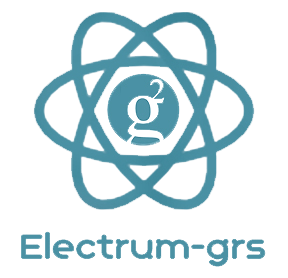
Electrum-grs is a lightweight "thin client" groestlcoin wallet Android based on a client-server protocol. Its main advantages over the original Groestlcoin client include support for multi-signature wallets and not requiring the download of the entire block chain.
If you are an ordinary user of Groestlcoin and simply want the convenience of a web wallet with the security of a real application and support for multi-signature, then Elecrum-GRS is the right choice for you.
Changelog Electrum-GRS 3.3.6:
• kivy: fix crash when aborting 2FA wallet creation (#5333)
• kivy: fix rare crash when changing exchange rate settings (#5329)
• fiat rate providers: added CoinGecko.com. Changed default provider to CoinGecko.com (#5188)
• Kivy:
- fix bug with local transactions (#5156)
- allow selecting fiat rate providers without historical data (#5162)
• Electrum protocol: the client's "user agent" has been changed from "3.3.6" to "electrum/3.3.6". Other libraries connecting to servers can consider not "spoofing" to be Electrum. (#5246)
• Several other minor bugfixes and usability improvements.
Changelog Electrum-GRS 3.3.4:
• The network layer has been rewritten using asyncio and aiorpcx. In addition to easier maintenance, this makes the client more robust against misbehaving servers.
• New wallet creation defaults to native segwit (bech32).
• RBF batching (opt-in): If the wallet has an unconfirmed RBF transaction, new payments will be added to that transaction, instead of creating new transactions.
• Randomise locktime of transactions
• Transactions now set nVersion to 2, to mimic Groestlcoin Core
• Android APK:
- build using Google NDK instead of Crystax NDK
- target API 28
- do not use external storage (previously for block headers)
• Android: Minor GUI improvements
Changelog Electrum-GRS 3.2.3:
• BIP39 seeds: if a seed extension (aka passphrase) contained multiple consecutive whitespaces or leading/trailing whitespaces then the derived addresses were not following spec. This has been fixed, and affected should move their coins. The wizard will show a warning in this case.
• fix #4491: on Android, if user had set "uBTC" as base unit, app crashed
• Several other minor bugfixes and usability improvements.
Changelog Electrum-GRS 3.2.2:
• Android: fix some crashes
• If present, libsecp256k1 is used to speed up elliptic curve operations. The library is bundled in the Windows, MacOS, and Android binaries. On Linux, it needs to be installed separately.
• Two-factor authentication is available on Android. Note that this will only provide additional security if one time passwords are generated on a separate device.
• Semi-automated crash reporting is implemented for Android.
• Qt/Kivy: added "gro" as optional base unit.
• Kivy GUI: significant performance improvements when displaying history and address list of large wallets; and transaction dialog of large transactions.
Features
• Encrypted wallet - the file that contains your groestlcoins is protected with a password. You are protected from thieves.
• Deterministic key generation - If you lose your wallet, you can recover it from its seed. You are protected from your own mistakes.
• Instant on - the client does not download the blockchain, it requests that information from a server. No delays, always up-to-date.
• Freedom and Privacy - The server does not store user accounts. You are not tied to a particular server, and the server does not need to know you.
• No scripts - Electrum-GRS does not download any script. A compromised server cannot send you arbitrary code and steal your groestlcoins.
• No single point of failure - The server code is open source, anyone can run a server.
• Transactions are signed locally - Your private keys are not shared with the server. You do not have to trust the server with your money.
• Firewall friendly - The client does not need to open a port, it simply polls the server for updates.
• Free software - Gnu GPL v3. Anyone can audit the code.
• Written in Python - The code is short, and easy to review.
• User Friendly - Support for Groestlcoin URIs, signed URIs and Groestlcoin aliases
• No Lock-In - You can export your private keys and use them in other groestlcoin clients.
• No Downtimes - Electrum-GRS servers are decentralized and redundant. Your wallet is never down.
• Proof Checking - Electrum-GRS Wallet verifies all the transactions in your history using SPV.
• Cold Storage - Keep your private keys offline, and go online with a watching-only wallet. Sign transactions from a computer taht is always offline. Broadcast them from a machine that does not have your keys.
• Multisign - Split the permission to spend your coins between several wallets using parallel BIP32 derivations and P2SH addresses ("2 of 2", "2 of 3"). Compact serialization format for unsigned or partially signed transactions, that includes the BIP32 master public key and derivation needed to sign inputs. Serialized transactions can be sent to cosigners or to cold storage using QR codes
It is appreciated if feedback of the following is provided:
1. Can you receive coins with legacy addresses? (small amounts to avoid losing them)
2. Can you receive coins with bech32 addresses? (small amounts to avoid losing them)
3. Can you receive coins with legacy testnet addresses? (small amounts to avoid losing them)
4. Can you receive coins with bech32 testnet addresses? (small amounts to avoid losing them)
5. Can you send coins with legacy addresses? (small amounts to avoid losing them)?
6. Can you send coins with bech32 addresses? (small amounts to avoid losing them)?
7. Can you send coins with legacy testnet addresses? (small amounts to avoid losing them)?
8. Can you send coins with bech32 testnet addresses? (small amounts to avoid losing them)?
9. Does it automatically detect servers under Tools - Network?
10. Are you able to sweep private keys?
11. Are you able to sign/verify messages?
12. Are you able to encrypt/decrypt messages?
This application is licensed under the GPL version 3. There is no warranty and no party shall be made liable to you for damages. If you lose coins due to this app, no compensation will be given. Use this app solely at your own risk.
The application may have unfound bugs and problems. To leave feedback:
1. PM me
2. Email: [email protected]
3. Post reports of erros in this topic.
Important:
Store your secret phrase somewhere safe!
The multi-signature and non native segwit addresses starts with a "3" and not with a "F".
Electrum-GRS is available in the Google play store:
https://play.google.com/store/apps/details?id=org.groestlcoin.electrumgrs
Source code:
GitHub Source server: https://github.com/Groestlcoin/electrumx-grs
Github Source server installer: https://github.com/Groestlcoin/electrumx-grs-installer
Github Source client: https://github.com/Groestlcoin/electrum-grs
Github Source Icons: https://github.com/Groestlcoin/electrum-grs-icons
Github Source locale: https://github.com/Groestlcoin/electrum-grs-locale


